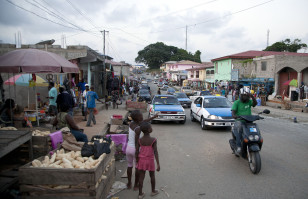
People walk along the main road in Bata, Equatorial Guinea, Tuesday, Jan. 20, 2015. Bata is one of the venues for the African Cup of Nations soccer tournament currently taking place. (AP)
BATA, Equatorial Guinea _ Word on the street is that the stadiums have never been so full of fans for any Africa Cup of Nations in the past.
That may be because Equatorial Guinea has given out 40,000 tickets for free so locals can attend the matches.
That’s one of the eyebrow-raising details that has popped up during this year’s premier African football tournament. The country’s authoritarian leader is Teodoro Obiang Nguema Mbasogo, who, in the course of becoming Africa’s longest ruling leader, has created what many consider to be a police state, funded largely by revenues from substantial oil revenues. That’s given him alot of leeway to make sure his countrymen and women are happy.
To be fair, quirks, oddities and complications are to be expected when a county — any country— steps in at the last moment to host a major international sporting event. Morocco had been slated to host the 2015 event, but was stripped of the honor at the last moment. Equatorial Guinea agreed to take on the task, just nine weeks before things got underway.
Throughout the country, police are a strong, visible presence. At every major roundabout in every major population center, armed police are conducting ID checks, even pulling people from cars to check their IDs.
Normally, it would take just 90 minutes to drive between the cities of Bata and Ebebiyin, which is also hosting matches. These days, however, it takes three hours, on account of all the police checkpoints along the way.
And though the matches are themselves festive, with fans chanting, cheering, singing and dancing, there isn’t a lot of spontaneous celebrating or partying in the streets, as is usually the case at major sporting events. By nightfall, streets are empty of festivities.
There’s been lots of griping about visas, as well. Cameroon’s delegation angrily complained to reporters that 20 of their officials had tickets to attend matches, but couldn’t get visas. Many of the visa restrictions stem from government effort to restrict immigrants seeking work or to benefit from the country’s oil wealth.

Soldiers and policemen take their positions at the Estadio de Bata in Bata during the Africa Cup of Nations 2015 tournament. (REUTERS)
Many observers are also praising the government efforts to keep Ebola in check. The government recruited dozens of doctors from Egypt, Cuba and France to advise and conduct preventative measures to block the deadly disease. Hand sanitizer is ubiquitous, with hotel clerks advising people to wash their hands immediately upon checking in.
Banners hanging over streets tout the African football confederation’s efforts at fighting Ebola. And passengers have their temperature taken by foreign doctors the minute they step off planes at airports.
